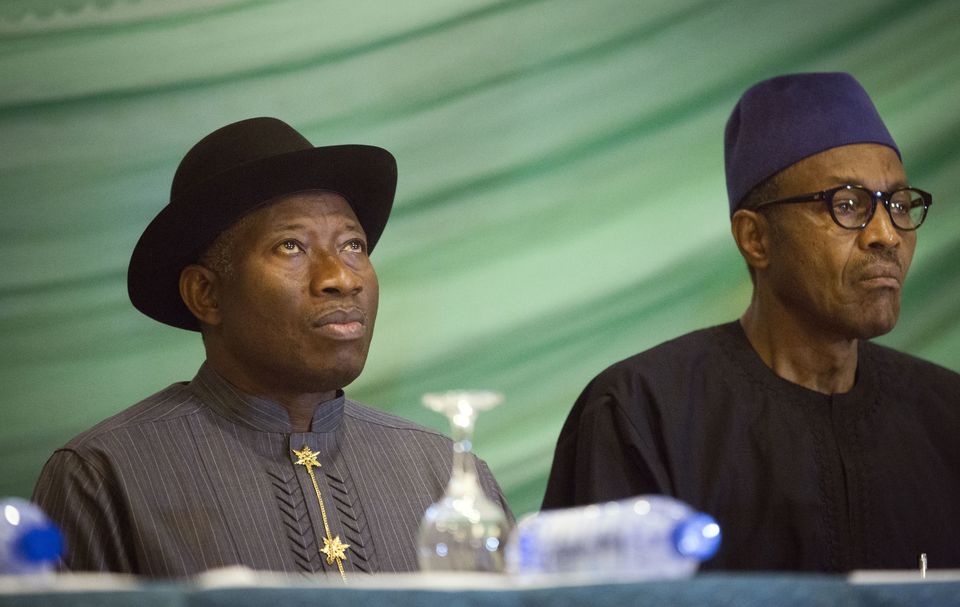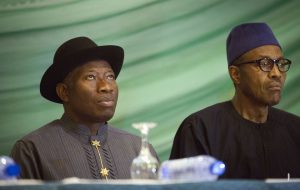Six weeks after a controversial postponement, the Nigerian presidential and National Assembly elections are set for March 28th, with the governorship and State House of Assembly elections scheduled to take place on April 11th. In spite of the volatile security environment, government officials have indicated that Nigerian citizens will be able to vote this Saturday, in an electoral contest that could prompt the first democratic alteration of power since the restoration of civilian rule in 1999.
The past month and a half has been anything but calm for Nigerian citizens. Whilst electioneering by the two main competing parties has intensified – concomitantly accruing the levels of acrimony between rivalling party leaders and supporters – the economy has taken a hit, largely as a result of the slide in oil prices. With the plummeting of investor confidence, capital outflows have increased. This has exacerbated a sharp depreciation of the Naira, exerting upward inflationary pressures at a time when the Central Bank is struggling to defend a tumbling currency with dwindling foreign reserves. Given the uncertainty surrounding the electoral outcome and the instability brought about by the ongoing fight against Boko Haram in the northeast, the incoming government will have an arduous task to restore economic and political stability in Nigeria.
Electoral adversity
With opinion polls indicating that the two main contending candidates, President Goodluck Jonathan and General Muhammadu Buhari, are neck-in-neck in their electoral prospects, the contentiousness of the electoral contest is likely to add fuel to the fiery pre-electoral campaign. Acknowledging the questionable validity of the different opinion polls, most point to the assertion that the race is simply too close to call, with some indicating that General Buhari, candidate of the opposition All Progressive Congress (APC), could claim a slim victory. Given this reality, the way in which the underfunded (and arguably politicised) Independent National Electoral Commission (INEC) will be able to operate – in tandem to how security forces respond to possible post-electoral reprisals – will determine the post-electoral outlook.
Moreover, the prevailing hindrances to the integrity of the polls are likely to offset legal contestations of the electoral outcome. With an incomplete distribution of the registered voter biometric cards, over 1.5 million disenfranchised Internally Displaced Peoples (IDPs), the threat of Boko Haram attacks in the states of Borno, Adamawa and Yobe, as well as the ongoing voter intimidation perpetrated by armed affiliates of the main parties, the eventual runner-up will be able to capitalise on any of these to question the legality of the votes. Indeed, although an outright majority by either the incumbent People’s Democratic Party (PDP) or the APC is unlikely, whoever will lose out by whatever margin could contest the validity of the results, thereby delaying the formation of a new government and possibly sparking post-electoral violence; as was the case in the wake of the 2011 elections, where over 900 people lost their lives.
With the discouraging signs of potential electoral reprisals in the Niger Delta and the north-eastern states (in the event that their constituencies’ preferred candidates do not win); the current prospects of post-electoral stability are foreboding. Hopes are that the pledges made by all parties to commit to non-violent practices during and after the election will uphold – regardless of the outcome.
Taming Boko Haram?
Since the deferment of the elections, Boko Haram has continued to carry out attacks, most notably in the Borno capital of Maiduguri in early March and recently in the towns of Bama, Gamboru and Damasak. Although it does not have contact with the press, the Islamist armed group has oftentimes reiterated its intention to disrupt the election, a threat that will no doubt prompt many northern voters to refrain from rendering themselves to the polls. With uncertainty regarding the police and armed forces’ ability to guarantee the security of voters, this reality threatens to undermine the veracity of the elections, not to mention the electoral prospects of the APC, given that most of its supporters herald from the north-eastern regions.
However, with the tentatively successful campaign that has been led against Boko Haram by a regional military alliance formed by Nigerian, Chadian, Cameroonian and Nigerien forces, the Islamist armed group has gradually found itself against the ropes. In the wake of the official (but unverifiable) reports stating that the regional armed forces have ousted Boko Haram out of an estimated 40 strongholds, if proven true, this promises to be an encouraging sign that the insurgents could be effectively cornered into their fiefdom of Gwoza, thereby reducing their operational capacity to attack.
Notwithstanding the progress in taming the armed group and the African Union’s plans to deploy an 8,700-strong Multinational Joint Task Force to root out Boko Haram, the armed group’s recent pledge of allegiance to Daesh could entail a potential boosting of its financial resources and enable it to remain resilient. Nonetheless, if the regional armed forces continue to steadily weaken Boko Haram, this could mark an unprecedented setback for the armed group. Assuming that the onerous task of eradicating Boko Haram materializes, the incoming Nigerian government will have to bolster its capacity to deliver public goods in the destitute north, so as to avert the very same phenomena that led to the armed radicalisation of Mohammed Yusuf’s group in 2009.
Post-electoral prospects
Given the reality that Nigeria could be facing a bumpy road until a new government is formed, the structural challenges that the elected authorities will be confronted with are anything short of cumbersome.
Politically, the ruling party will have to play a more conciliatory role in an endeavour to reduce the entrenched enmity arising out of the politicization of religious and ethnic divisions. Moreover, given the pending resolution of the scandal involving the fraudulent mismanagement of oil funds under the Jonathan administration, the incoming president will have to take a tougher stance to combat nation-wide corruption, lest he risks losing legitimacy vis-à-vis the electorate. Militarily, the new governing authorities will be faced with the challenge of restoring security in the north while combatting the engrained institutional deficiencies that continue to undermine the strength of the Nigerian armed forces.
Economically, the new President will have to regenerate momentum to implement economic reforms, most notably in the dominant oil sector as it constitutes over 70% of government revenue. In particular, the National Assembly will have to expedite the passage of the Petroleum Industry Bill as well as implementing an institutional mechanism to reduce the politicized management of its oil savings. In addition, given the volatility arising from its overt dependence on crude exports and its currently precarious fiscal balance, the federal government will have to commit to greater fiscal prudence so as to free up enough space to augment capital expenditure in growth-enhancing infrastructural and developmental projects, not to mention the necessity to boost public investment to support the expanding services and entertainment sectors.
The looming elections are indubitably set to mark a watershed for Nigeria. In the hopes that it will be for better rather than for worse, a newly elected government will have to take the arduous task of implementing long-needed reforms in the political and economic spheres. This will however be undermined by the prevalence of factionalism within the National Assembly, with impasse over crucial legislation constituting a fundamental hindrance to nation-wide progress.
As a result, Africa’s most populous nation and biggest economy will need a more conciliatory, accountable and transparent federal government to secure its path to democratic maturity and economic stability. The question remains as to whether any of the two main contending candidates can deliver.

